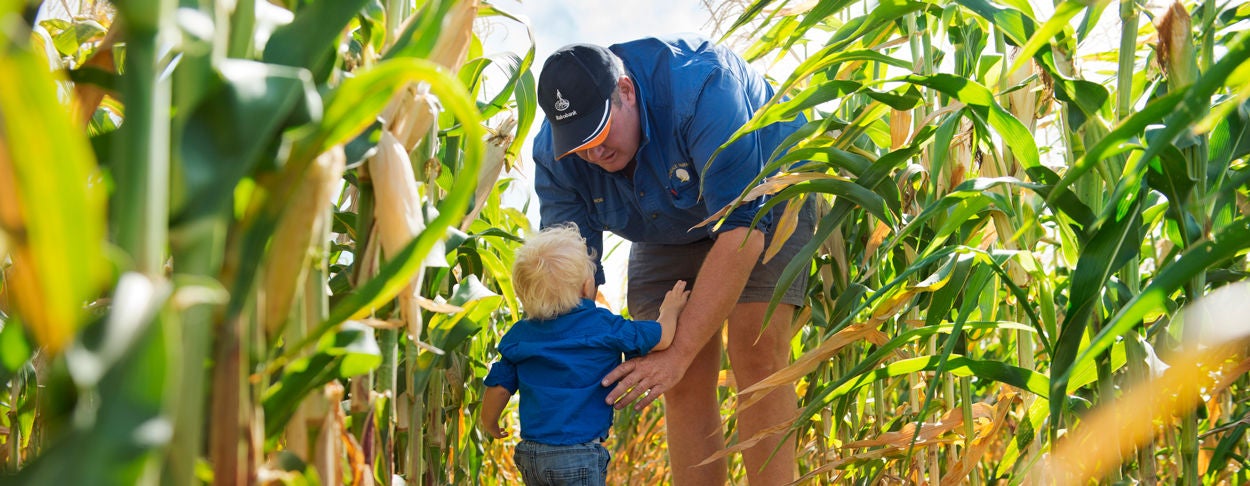Posted by on
30/06/2022
‘Cautiously optimistic’, it’s an oftentimes overused phrase, but for many farmers cropping in Central Queensland (CQ), it captures current emotions perfectly.
Widespread rain in July topped up water stores and has set some farmers up for potentially their best winter crop in a decade. Combine the moisture profile with low interest rates and strong commodity prices and it’s no wonder so many producers have a bit of a spring in their step. One of these cautiously optimistic CQ farmers is Robert Ingram (37) who, together with his wife Danni (31) and son Max (2), farms Avondale a 400 hectare irrigation property 12km west of Emerald.
Robert said while all of their crops are under irrigation, they were still very appreciative of the July rain event. “The timing of that rain really couldn’t have been better,” he said. “We were getting low on our allocation and prior to July there really hadn’t been any decent rain falls to top up the dam. The dam is now at 50 per cent, which will have irrigators feeling a lot more comfortable.”
The Ingram family grow a rotation of cotton, popping corn and chickpea under irrigation, although this year Robert has elected to plant additional chickpeas to take advantage of the record price. “We’ve currently got 250 hectares planted to chickpea and 100 hectares of cotton,” Robert said. “As long as the weather now plays its part and we don’t get rained out, it should be a good year for us.”
The Fairbairn irrigation scheme
Avondale has been in the Ingram family since Robert’s parents Bob and Anne purchased it as an undeveloped block in 1978. The Fairbairn Dam had been completed in the early 1970s, and was capable of holding three times the water of Sydney Harbour when filled to capacity. As irrigation channels were built they opened up opportunities for new commodities and industries in the region. Bob was one of the early irrigators and Robert said that anyone who had seen it back then would not recognise it as the same place today.
“It was basically virgin country; Dad developed it into cultivated land, had it levelled for irrigation and began cropping. In the early days he grew a bit of forage hay and oats,” he said.
“We started growing cotton in the early 80s and have continued growing it since then, it still makes up an important part of our rotation.”
Varietal improvement spurs productivity
While they might be growing the same crop, the way it’s grown has definitely changed over the past thirty years. The Ingrams now produce an average of 10 bales of cotton per hectare, a substantial production increase from the seven and a half bales they used to receive.
“Along with better equipment and farming practices the improvement in cotton varieties has been a huge contributor to increasing production.”
“We now have Roundup Ready varieties, which means we can get onto weeds and regrowth early and as needed without worrying about damaging the plant. Spraying early also means we can use fewer applications and still stay on top of the problem, which has additional environmental benefits.”

Rotating between corn, chickpea and cotton has increased cashflow for the Ingram’s business and reduced risk while also increasing soil health. “The three crops fit well into our winter/summer rotation,” Robert said. “Corn also has the added benefit of being a good break crop for disease.”
The most recent additions to the ‘Avondale’ irrigating arsenal have been two centre pivots that Robert said have enabled even greater flexibility for their business. “The country that we needed to irrigate was up a bit of a slope so we needed to go in this direction, but the beauty of overhead irrigating is the speed at which we can harvest and replant,” he said. When the Ingrams decided to add the most recent centre pivot, one of the first people they checked in with was their Rabobank Rural Manager, Leon Roberts.
“Leon really understands our business and I think Rabobank seems to understand farmers more than the other banks."
“There are things we do in our business that other banks might see as financially risky but because Leon really understands what we do he will go in and bat for us to get the finance we need.”
Every man needs a shed
After all the years working with them, Leon said he feels like more of a friend to the Ingrams than a banker, and even makes regular visits to the Avondale shed drinks. “We older blokes used to always meet up with Bob at the Avondale shed on a Thursday evening to catch up and socialize,” Leon said.
“After Bob’s passing Robert encouraged the shed drinks to continue, it might sound frivolous but having somewhere that neighbours can meet up, have a laugh and maybe even share a concern is important in the agricultural industry, which can often be pretty isolated.”
For Robert, it’s back to planting cotton, but with the sun shining, crops growing and a brother or sister for Max due very soon, Robert and Danni look set to continue to greet their cautiously optimistic neighbours at the Avondale shed.
